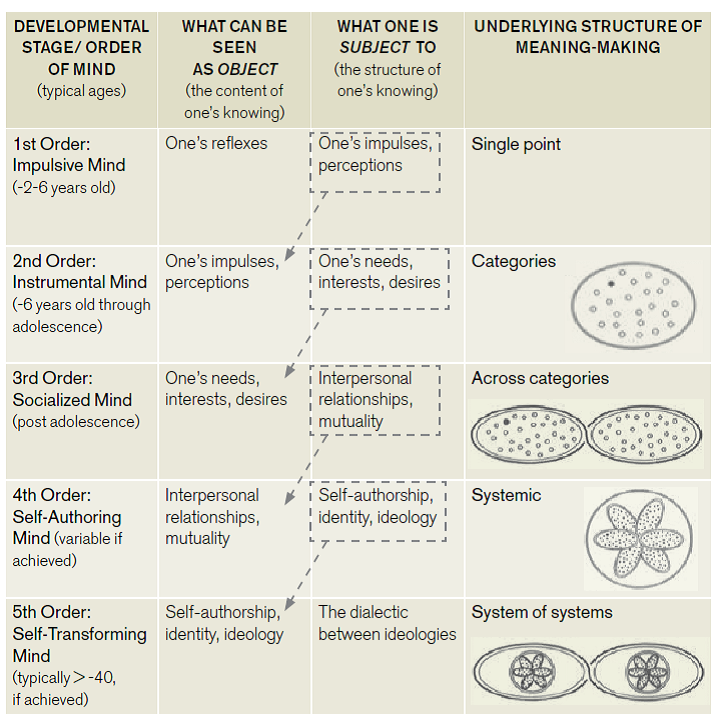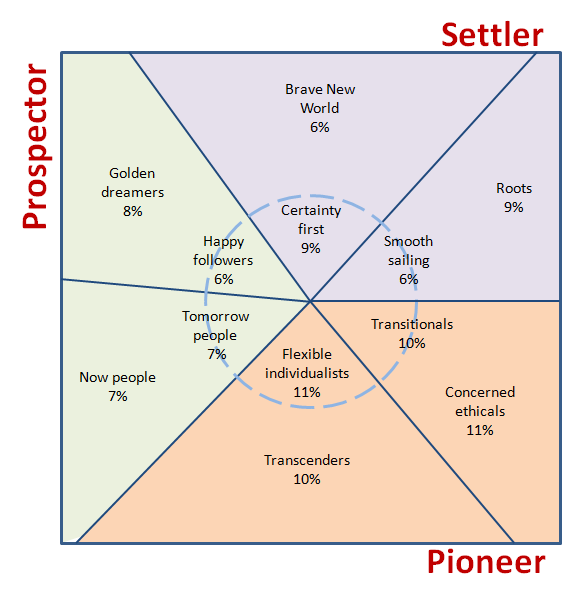Occasionally it can feel as though there are a thousand and one ways of making sense of the world. That is, of understanding why people think and behave in the way that they do and of knowing what can be done to help people live the lives they want to lead. Not a month goes by without the publication of another book telling us about the most important thing we need to know if we want to solve our problems – be it the importance of willpower, the power of ‘influencers’, the art of taking things more slowly, or of the significance of ‘group-identity’ and belonging.
While some of these ideas are no doubt useful, it can be a struggle to keep track of all the lessons that are supposed to help guide our day-to-day actions. Indeed, many end up competing with one another for our attention, and often it is the salient ones that triumph over the most important. Hence the nod to Malcolm Gladwell's work on 'influencers' just now.
To find our way out of this maze of different concepts, it can be helpful to take a step back and try and view the whole picture. In practice, this means drawing upon a set of ‘meta concepts’ through which to make sense of the world. These aren’t lessons or rules as such, but more ‘lenses’ that can be applied to view different issues more clearly.
At the RSA, there are a few lenses that are either dominant or emerging. Here’s a brief summary of three:
Cultural Theory
Cultural Theory tries to make sense of problems by viewing them in terms of the different ‘cultural understandings’ that are at play. First conceived of by the anthropologist Mary Douglas during her studies of different communities in Africa and elsewhere, Cultural Theory suggests that there are four dominant understandings that can be found (to varying extents) in different groups and areas: egalitarian, individualist, hierarchical and fatalist.
Whether these different cultures are present depends upon two different criteria: Grid and Group. Grid relates to the importance of rules and structures, whereas Group refers to the importance of collective control and consensus. Where there are high Grid and Group orientations, we find hierarchical cultures. Conversely, where there are low Grid and Group tendencies, we find individualist cultures.
The message at the centre of this theory runs as follows: efforts to address challenges need to draw upon and broach all of these different cultural understandings if they are to effect change. Since every community contains some element of Grid and Group, efforts at tackling problems are unlikely to bear fruit unless they accommodate each perspective. We need a mixture of rules (Hierarchicalism), norms and community values (Egalitarianism) and incentives and support structures (Individualism). Matthew Taylor recently used the example of cash-in-hand work as one particular challenge that could be better addressed by applying the lens of cultural theory. To date, we have an overtly ‘elegant’ hierarchical approach (through sanctions and inspections), at the expense of egalitarian (nurturing tax fairness) and individualist ones (tax/benefit incentives).

and Clumsy Solutions: the Role of Leadership'
Mental complexity
The notion of mental complexity was developed by the Harvard professor Robert Kegan some years ago. Mental complexity refers to how we know, not just what we know. Kegan identifies a number of stages of mental complexity (or ‘adult development’), each of which offer people greater scope to see things objectively rather than subjectively. See the graph below.
This ‘subject-object’ relationship is important. When we take things as subjective, they ‘have us’, whereas when we take things as objective, we ‘have them’. The difference is between being caught in the grip of something with your blinders on, and being able to take a step back and get some perspective. Kegan uses the analogy of the scriptwriter vs. the actor. The actor follows the lines and is caught up in the minute-by-minute action, whereas the scriptwriter views things from afar and is able to edit the script as they see fit.
In short, higher levels of mental complexity give people a greater awareness of their emotions and attitudes and allows them to take more measured decisions. When applying this lens to view different issues, it prompts us to think about whether people are mentally ‘up to the task’ of undertaking the behaviours and actions we expect of them.
One example of where this has been used to make sense of an issue (beyond the territory of organisational management) is the RSA’s work on the Big Society. Our argument, published in a report earlier this year, is that the Big Society presents people with a ‘hidden curriculum’ of emotional and relationship-based tasks that require a certain order of mental complexity – the ‘self-authoring mind’ – which the majority of the population do not hold.

Values Modes
The concept of Values Modes suggests that there are three main value groups: Settlers, Prospectors and Pioneers. Where you fall within each of these groups depends upon the extent to which you are ‘sustenance driven’, ‘outer directed’ or ‘inner-directed’ (there are sub-groups to each of the main three). Settlers, being primarily sustenance driven, like stability and security; Prospectors, being outer-directed, look for things that confirm their identities and boost their self-esteem; and Pioneers, as mostly inner-directed, seek out the new and novel.
Two of the foremost proponents of Values Modes, Chris Rose and Pat Dade, argue that used in the right way, it can be an invaluable tool for understanding how different policies and initiatives are likely to affect people’s behaviours. For example, one of their key arguments is that you have to tailor initiatives and messages to fit different value groups. You can’t expect to heavily influence a Settler’s behaviour by showering them messages about new trends. Highlighting social norms would be more appropriate, but then this wouldn’t do as much to shift the behaviour of Pioneers who are less concerned about what other people are doing.

'The Big Society: Why values matter'
Related articles
-
Will Covid-19 transform local public services?
Joan Munro
The way local public sector leaders pulled together has created an opportunity for transformational changes.
-
Glasgow and Pittsburgh: cities of steel
Jamie Cooke
New partnership between two cities with a bright future.
-
Changing how we see heritage can help us build back better
Becca Antink
How the heritage sector is making a difference in local communities.




Join the discussion
Comments
Please login to post a comment or reply
Don't have an account? Click here to register.
In making sense of the world, we create "realities", we make connections ("li") between things ("res"). Based on the concepts of Will McWhinney's "Creating Paths of Change", I've developed a metapraxis: reflections on (our) actions. This lens is more like a mirror: it shows you four different ways of looking at the world as it presents itself to you - a bit like Mary Douglas. Models and theories thus become re-presentations.
In the upcoming European IAF-Conference in Geneva I'll present a pre-conference session of a day showing how one can use these four lenses in designing interventions and sessions.
Hi Ben, thanks for the post, really interesting.
Related to Kegan's stages, I suppose you are familiar with Kohlberg's stages of moral development?
http://en.wikipedia.org/wiki/L...
Thanks Ben,
This is really helpful! Maybe it should be included as part of the 'Welcome to the RSA' pack!?
Alex
Hi Ben,
Great post - on three of my favourite topics :-)
We need to be using lenses like these, I believe, if we really want to build sustainable solutions, that respond to people as they are.
Too many solutions presume people have one set of motivations or values - and end up very one-sided and 'brittle'. (Or 'elegant' as Cultural Theory calls such blinkered solutions).
There should be a fascinating report emerging soon from the work done by the RSA and The Campaign Company in Newham - which used the Maslow-based 'Values Modes' to look at citizens and networks.
On the Values Modes front, there was also an interesting Independent blog by leading environmental campaigner Tony Juniper recently, looking at the intriguing battle between the Values Modes and the Common Cause approaches to environmental behaviour change. Despite having the same goals, they're both rather concerned that the other approach could really mess things up!
Take a look:
http://blogs.independent.co.uk...
(NB there are 12 Values Mode segments really - 3 is just the top-level categories, as the graphic shows).
Cultural Theorist Michael Thompson recently sent me a great paper by Ney and Verweij titled 'Messy Institutions for Wicked Problems: How to Generate Clumsy Solutions'.
It looked at a range of tools for group collaboration and innovation to see which ones take into account the different mentalities most fully.
Tools covered included Citizens' Juries, Future Searches, Open Space, 21st Century Town Meetings etc.
I think Future Search came out as being the approach which most involves all the different mentalities (egalitarian, individualist, hierarchical etc).
Perhaps this means it's a tool the RSA should start to use?
I also think it would be great to take a pressing social issue of the moment (youth unemployment? obesity?) - and ask leading practitioners in Cultural Theory, Cognitive Complexity, Values Modes, Spiral Dynamics, Jonathan Haidt's moral matrices, Action Logics Williams' 11 Lenses, et al to write an analysis/solution - using their own particular lens. And perhaps even include someone who might disagree with it all, like Dave Snowden ;-)
This could make for a fascinating publication - and show how helpful these different models of plural rationalities might be.
I don't believe that each such approach - on its own - will ever achieve enough influence, but brought together... anything could happen! ;-)
Most policy-makers have never thought about such approaches that respond to plural rationalities/developmental diversity, I suspect (even if NGOs, corporates etc might be using things like Values Modes day in, day out), so it could be quite an influential piece of work.
Matthew
---
Matthew Kalman Mezey
(Online Community
Manager)
RSA
Tel 020 7451 6825
www.thersa.org
A live dashboard webpage showing RSA online activity
is here: http://bit.ly/onlineRSA
twitter.com/MatthewMezey
twitter.com/thersaorg
rsafellowship.com
(online community)
Is there an ‘RSA
Connector’ for your country yet?: http://bit.ly/RSAconnectors